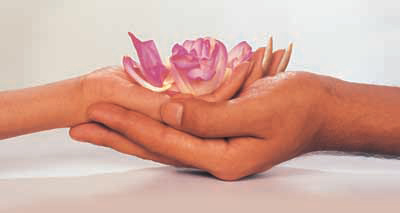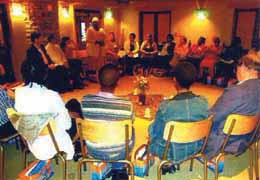- Home
- Archive -Oct 2010
- Peace between t. . .

Peace between the sexes
- In :
- Personal Growth
October 2010
By Will Keepin and Cynthia Brix
Satyana Institute’s Power of Reconciliation project, is aimed at resolving gender discrimination problems, in a spirit of understanding and compassion
 |
Last year, two boys raped my 14-year-old daughter,” Verena confided ruefully in a soft voice. “One of the boys was HIV positive,” she continued, her voice shaking. Verena took a long, slow breath, clutching a crystal heart in her hand. “Now, my daughter is HIV positive,” she said with an air of defeat, as large tears welled up in her eyes. Verena’s words struck home like a dagger in the hearts of everyone in the room. A Member of Parliament in South Africa, Verena was sharing her personal story on the fourth day of a special workshop called ‘Gender Reconciliation’ held for Members of Parliament and other South African leaders. The authors and their staff at Satyana Institute organised the six-day event in Cape Town in November 2006. Joining as co-facilitators, were Nomfundo Walaza, Director of the Desmond Tutu Peace Center in Cape Town, and Karambu Ringera of International Peace Initiatives in Nairobi, Kenya. Nozizwe Madlala Routledge, a Member of Parliament and former Deputy Minister of Health and Defense in South Africa, hosted the gathering.
Sitting in silent witness, surrounding the women’s circle was a circle of men – also parliamentarians and other leaders – listening intently, some choking back tears. This was the first time male and female Parliamentarians had ever shared so deeply and personally, the catastrophic gender violence in South Africa. Verena continued. “When I first learned about the rape, I blamed my daughter. I figured she had been sleeping around. I was so angry with her. How could she let those boys have their way with her?” Verena paused, looking up slightly and glancing at each woman before continuing. “But at the hospital, I found out that she had been a virgin when she was raped. She had been truthful, and I did not believe her. I feel so ashamed. How could I blame my daughter, my baby girl? I’m so angry with myself!” Tears streamed down Verena’s face as she kept repeating, “How could I? How could I?”
Gender injustice
Verena’s story illustrates one of the countless realities of gender injustice – in this case, an example of women blaming women for their violation and oppression. Verena’s sorrowful tale is one of many hitherto-untold stories disclosed by women, and documented in the recent book, Divine Duality: The Power of Reconciliation between Women and Men (Will Keepin with Cynthia Brix and Molly Dwyer, Hohm Press, 2007). The premise of this project is that both women and men suffer due to gender injustice, and each needs the other for a true and complete healing.
The Power of Reconciliation project creates a forum for women and men, to jointly confront gender injustice, and unravel the insidious knots of cultural conditioning and oppression, relating to gender and sexuality. In this context, the ‘undiscussables’ of gender are confronted, as participants plumb the depths of their experiences, move beyond habitual ways of relating, to discover new forms of healing, and authentic intimacy between the sexes. Satyana Institute has trained a group of 15 professional facilitators in this work in the United States, and is initiating a new training programme in South Africa.
After Verena’s story, more agonising tales emerged from the women’s circle. A deep, mournful sob erupted into the room, startling the group, when one man broke down in despair while hearing one woman after another share tales of abuse, rape, AIDS, and sexual harassment. The group was silent for several minutes, as two men went over and gently embraced the grieving man. Afterwards, roles were reversed, with the women listening in silent witness to the men’s truth forum. Again, poignant stories emerged of betrayal, abuse, and sexual violation, and gruelling accounts of masculine socialisation, endured in the cultural institutions of church, military, corporation, family, and society.
The process follows an alchemical wisdom – the pain of gender oppression is confronted head-on; and deep in the core of the wound a hidden light or grace is discovered, which unfolds into a profound healing and transformation. Toward the end of each Power of Reconciliation workshop, the women and men have ceremonies to honour and bless one another. The male Parliamentarians in South Africa choreographed a beautiful hand washing ceremony. Carrying a bowl of water, they gently washed, dried, and massaged lotion on the hands of each woman. Then the men stood up in a line, faced the women, and delivered the following declaration:
“We have met over the past five days in community as men, and in community with you as men and women. We have listened to each other’s stories – some personal, others told on behalf of vulnerable, degraded, hurt, brutalised human beings – all for no other reason than that they are women, sisters, mothers, and girl children.
“We have heard, too, that through the social structures of power and decision-making, many of our brothers have abused our intended roles of caring and protection – for their own selfish power, personal pleasure, and gain.
 A group of nuns and priests come clean on gender issues A group of nuns and priests come clean on gender issues |
The bonds of humanity have been broken. We acknowledge that we have shared in the unfair and unjust advantage that has upset the Creator’s intended balance of human relationships for love, companionship, and co-operation. We further acknowledge that we have been complicit in breaking the intended dream of equality.
“So now, we come forward to say to you, we are sorry. We affirm that we want to start anew. And we ask, will you accept our offer to take responsibility, as we commit ourselves to live out – and challenge and support all men everywhere to live and work for gender equality, and thereby seek reconciliation?”
In silence, the men then bowed before the women.
It was a profound moment, to witness this group of male leaders in South Africa – a nation plagued by the worst AIDS crisis on the planet and skyrocketing sexual violence – declare their deep commitment to transforming gender injustice across the land. The women were stunned. Some wept. Nothing had prepared them for the power of this offering. Deeply moved with their hearts open, the women honoured the men with a ceremony that included a colourful dance of veils.
Introducing gender reconciliation in India
The Power of Reconciliation model has proven effective in not only the United States, and other affluent western countries, but also in more challenging cultures, where gender oppression is severe, such as India and South Africa.
Satyana Institute has been active in India since 2002. The Sadhana Institute, a pastoral retreat centre outside Mumbai founded by Jesuit priest, Anthony de Mello, hosted a week-long programme for Catholic nuns and priests. Satyana staff conducted subsequent programmes at Sadhana Institute entitled, ‘Mysticism: Birthright of the Heart,’ including one in 2007, that again incorporated the Power of Reconciliation process.
The priests and nuns exhibited courage and compassion, as they tackled the injustice and patriarchal institutions of both Indian society and the Catholic church. In one event, there was a backlash within the group following the most poignant revelations, led by a few priests against the nuns and other priests, who had brought these revelations to light. This precipitated a confrontation in the group, and the priests and nuns, worked tenaciously through the ensuing difficulties. Eventually they reached a profound resolution, which brought deep healing and liberating release for all. The power of gender to humble a community to its knees, and then uplift it into grace, was exquisitely demonstrated.
After the intensive and intimate healing work, as reported later in their community newsletter, the nuns, and priests in both these events, honoured and blessed one another in a remarkably beautiful ritual. The group testified to the healing experienced, which included an awareness of the partiality and incompleteness of their perceptions of each other, and opening up to the healing light of compassion for one another. There are also signs of a major shift that is occurring in the consciousness of many of the participants, and a deepening awareness of the need to include in religious formation, the wonderful richness of this holistic approach.
Gender reconciliation across the globe
Despite major advances made by the women’s and men’s movements, gender injustice continues to afflict most human societies across the globe including the affluent West. However, a new era is dawning that holds great promise for transforming the ancient gender wound.
Committed groups of women and men – now in four continents, are working diligently to transform gender injustice within their respective societies, and reclaim the sacred union of feminine and masculine. These women and men have one thing in common – they know that the era of ‘patriarchy’, which has plagued human societies across the globe for millennia, is now coming to an end. These are men who know that beyond all the male privileges offered by patriarchal society, there is another far more profound privilege; to uplift the feminine, and begin dismantling the structures of patriarchy altogether. These are women who know that the gender war can never be won by either side, but is rather a collective spiritual crisis, which can only be transformed by calling upon the larger spiritual wisdom and unitive consciousness of all of humanity. The passion and inspiration guiding these dedicated gender reconciliation circles is not a dream but rather active incubation of new pathways for women and men that foster a culture of integrity, love, and mutual respect between the sexes. A new era of gender reconciliation is being born.
Will Keepin, Ph.D., and Cynthia Brix, M.Div. M.A. direct the Satyana Institute based near Seattle, Washington. They are authors of Divine Duality: The Power of Reconciliation between Women and Men (Hohm Press, 2007, and Women Healing.
They teach graduate courses on new pathways to peacemaking, and lead spiritual retreats for religious leaders. More information: www.satyana.org
Will Keepin and Cynthia Brix will facilitate a similar workshop at Jivanvikas Sadan, Bandra, Mumbai, on February 11 -13, 2011.
Contact: Hazel at jvsadan@gmail.com, for workshops in India
To read more such articles on personal growth, inspirations and positivity, subscribe to our digital magazine at subscribe here
Life Positive follows a stringent review publishing mechanism. Every review received undergoes -
- 1. A mobile number and email ID verification check
- 2. Analysis by our seeker happiness team to double check for authenticity
- 3. Cross-checking, if required, by speaking to the seeker posting the review
Only after we're satisfied about the authenticity of a review is it allowed to go live on our website
Our award winning customer care team is available from 9 a.m to 9 p.m everyday
The Life Positive seal of trust implies:-
-
Standards guarantee:
All our healers and therapists undergo training and/or certification from authorized bodies before becoming professionals. They have a minimum professional experience of one year
-
Genuineness guarantee:
All our healers and therapists are genuinely passionate about doing service. They do their very best to help seekers (patients) live better lives.
-
Payment security:
All payments made to our healers are secure up to the point wherein if any session is paid for, it will be honoured dutifully and delivered promptly
-
Anonymity guarantee:
Every seekers (patients) details will always remain 100% confidential and will never be disclosed
